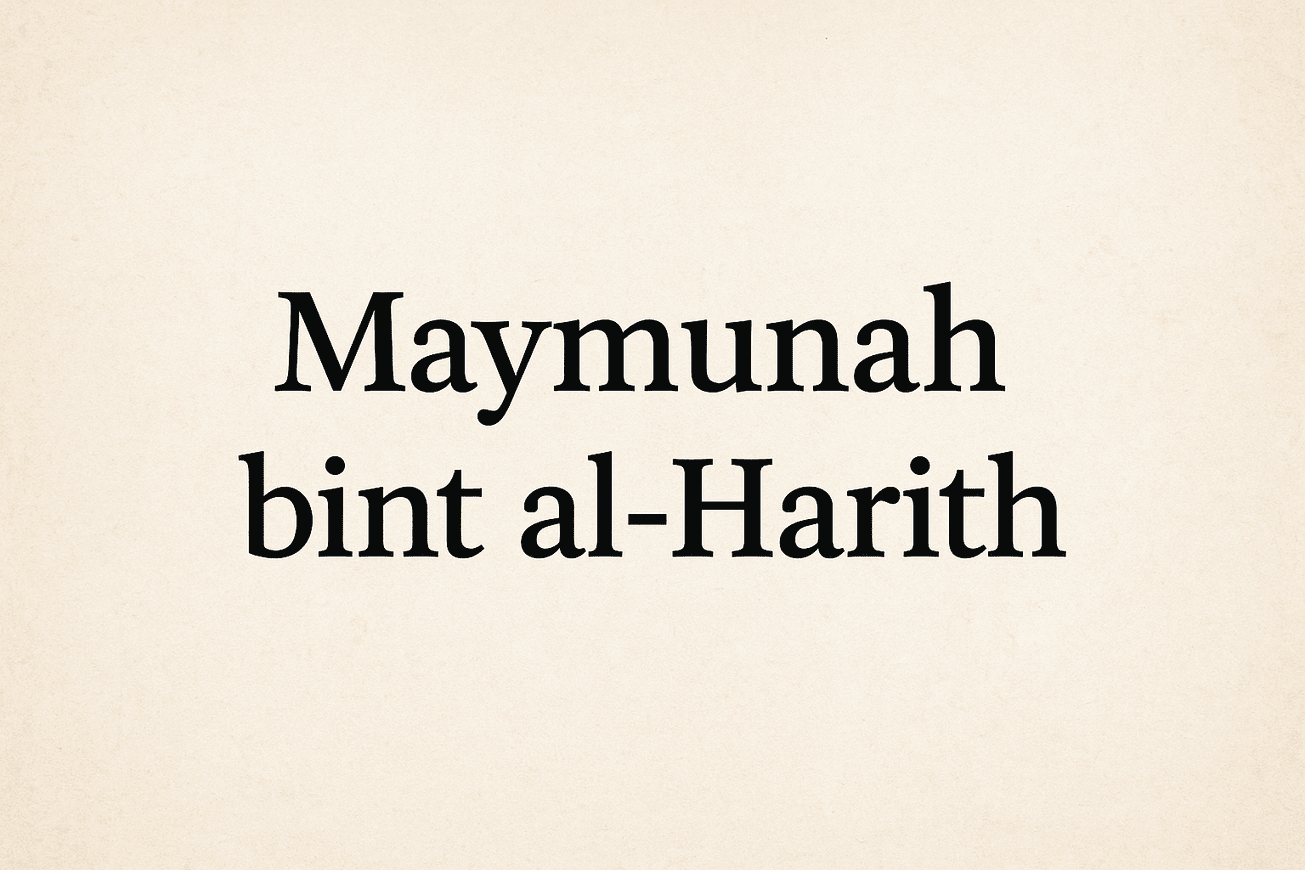Maymunah bint al-Harith (RA) holds a revered place in Islamic history as the eleventh and final wife of the Prophet Muhammad (peace be upon him). Born around 594 CE, her original name was Barra, which the Prophet later changed to Maymunah, meaning “blessed” or “one who brings good tidings.” Her marriage to the Prophet was significant not only for its spiritual dimension but also its timing, symbolizing a moment of reconciliation and mercy following the Treaty of Hudaybiyyah, an important peace agreement between Muslims and the Quraysh tribe of Mecca.
Maymunah bint al-Harith

Maymunah belonged to the noble Banu Hilal tribe of Mecca. Her father was Al-Harith ibn Hazn, and her mother was Hind bint Awf, a woman known for her noble character and influential familial ties. Maymunah’s family connections were intertwined with the Prophet’s tribe and his household. For instance, her sister Umm al-Fadl Lubaba was the mother of Abdullah ibn Abbas, the Prophet’s cousin and a prominent Islamic scholar. Another of her half-sisters, Zaynab bint Khuzayma, was also one of the Prophet’s wives. These close relations placed Maymunah at a crossroads of significant social and religious networks in early Islamic society.
Before her marriage to the Prophet, Maymunah had endured personal challenges, including widowhood and limited security, which made her one of the vulnerable women in the community. Her yearning to align herself with the Prophet and the Banu Hashim clan—his family—was a heartfelt expression of seeking both protection and spiritual fulfillment.
Read about: Khadijah bint Khuwaylid
Marriage to the Prophet Muhammad (peace be upon him)
Maymunah’s marriage to Prophet Muhammad (peace be upon him) took place in Shawwal of the 7th year of the Hijrah (around 628 CE), shortly after the Treaty of Hudaybiyyah. This treaty allowed Muslims from Medina to perform ‘Umrah (a lesser pilgrimage) in Mecca, where the Prophet seized the opportunity to formalize this marriage, which solidified ties between the Muslims and the Quraysh, fostering unity and peace.
At the time, the Prophet was 60 years old, and Maymunah was about 36. The marriage was marked by deep blessings; the Prophet changed her name from Barra (meaning “pious” or “virtuous”) to Maymunah, signifying the blessings and good tidings she would bring to the Muslim community. This marriage was the last that the Prophet solemnized and symbolized a culmination of his family life.
The marriage brought dignity and protection to Maymunah, elevating her from her vulnerable position. It also produced a strong bond between clans and tribes, illustrating the social and political wisdom underlying the Prophet’s marriages.
Read about: Hind bint Abi Umayyah (Umm Salama)
Contribution and Legacy
Maymunah bint al-Harith was known for her piety, wisdom, and commitment to Islam. She was a knowledgeable companion who narrated numerous authentic hadiths (sayings and traditions) of the Prophet, particularly about women’s worship, purification, and other aspects of Islamic jurisprudence. Her narrations provide detailed insight into the Prophet’s personal practices, such as his method of ritual washing (ghusl), which she observed intimately.
Her scholarly contributions were invaluable in preserving authentic Islamic rituals and teachings, particularly for women. She was revered as a teacher and a source of spiritual guidance among early Muslims.
An illustrative story is related to the Prophet’s only pilgrimage (Hajj) after the advent of Islam. The companions were unsure if he was fasting due to the intense heat and his deep devotion. Maymunah sent him a cup of milk, which he drank, signaling that it was permissible not to fast, thus easing the practice for the companions. This story shows her loving concern and active role within the Prophet’s household.
Recommend: Sawdah bint Zam’a
Later Life and Death
Maymunah bint al-Harith passed away at the age of about 77 or 80 in 51 AH (approx. 671 CE), making her the last surviving wife of the Prophet. She died during a journey returning from Mecca at a place called Sarif. Her death marked the end of an era for the close companions of the Prophet and the early formative period of the Muslim community.
FAQs
Who was Maymunah bint al-Harith?
Maymunah bint al-Harith was the eleventh and final wife of Prophet Muhammad (peace be upon him). She was known for her piety, wisdom, and contributions to Islamic teachings through hadith narration.
What was significant about Maymunah’s marriage to the Prophet?
Her marriage took place shortly after the Treaty of Hudaybiyyah and was notable for solidifying peace between the Muslims and the Quraysh tribe, offering protection to Maymunah, and marking the last marriage of the Prophet.
What was Maymunah’s original name and why was it changed?
Her original name was Barra, meaning pious or virtuous. The Prophet Muhammad changed it to Maymunah, meaning blessed or good tidings, reflecting her blessed role.
What contributions did Maymunah bint al-Harith make to Islamic knowledge?
She narrated many authentic hadiths, especially concerning women’s religious practices like purification and worship, thus playing a key role in preserving the Sunnah.
When did Maymunah bint al-Harith pass away?
She passed away around 51 AH (671 CE) at the age of approximately 77-80, during a journey back from Mecca.
Conclusion
Maymunah bint al-Harith was not only a beloved wife of Prophet Muhammad (peace be upon him) but also a beacon of faith, humility, and knowledge for the early Muslim community. Her life illustrates the integration of personal devotion with social responsibility, bridging noble tribal lines through marriage and preserving the legacy of Islamic teachings through her narrations. As the last wife of the Prophet, her story symbolizes the culmination of Prophetic family life and the transmission of wisdom to generations of Muslims. Maymunah’s enduring legacy is one of spiritual dignity, profound wisdom, and compassionate leadership.


